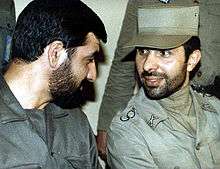Ali Sayad Shirazi
| Timsar Ali Sayad Shirazi | |
|---|---|
 | |
| Nickname(s) | The Iron Man[1] (مرد فولاد Mard-e-Foulad) |
| Born |
13 May 1944 Kaboudgonbad, Khorasan, Iran |
| Died |
10 April 1999 (aged 54) Tehran, Iran |
| Allegiance |
|
| Service/branch |
|
| Years of service | 1964–1999 |
| Rank |
|
| Battles/wars |
Kurdish rebellion Iran–Iraq War Operation Undeniable Victory Operation Beit ol-Moqaddas Operation Zafar 7 Operation Nasr-4 Operation Mersad |
| Awards |
|
Ali Sayad Shirazi (13 June 1944 – 10 April 1999) (Persian: علی صیاد شیرازی) was chief-of-staff of the Iranian Armed Forces during the eight-year Iran–Iraq war. He was assassinated in 1999 by the Mojahedin-e-Khalq (MEK). Prior to that, he had a central role in suppressing the armed rebellion in Kordestan province in 1979.
Early life
Shirazi was born in Kabud Gonbad Rural District, Iran, on 13 June 1944. His father being a non-commissioned officer in the Army motivated him to join and in 1964 he joined as a cadet.[3]
Career
Shirazi was commissioned as a Second Lieutenant in the Artillery and in 1974, he was sent to the United States for further military education. When he returned to Iran he showed opposition to the policies of the Pahlavi government and participated in some street demonstrations. He then joined the opposition movement against the Shah. During the 1979 revolution, he served in the 64th Infantry Division in Urumiyeh.[4] He was later awarded the rank of lieutenant general of the Iranian armed forces.[3]
During the Iran–Iraq War Sayad Shirazi became one of the most important generals of Iran. In 1981, Ayatollah Ruhollah Khomeini appointed him commander of the Ground Forces of the Iranian Army. In 1982, he led the Iranian Pasdaran and Basij soldiers to victory in the Iranian Operation Undeniable Victory, this was the first time Iran was able to defeat Iraq in a major battle, Iran broke through Iraq's "impenetrable" defense lines and expelled them from the Dezful-Shush area, this operation is considered by many as the turning point in the war. During Iran's attempt to capture Basra with Operation Ramadan Shirazi was said: We will continue the war until Saddam Hussein is overthrown so that we can pray at Karbala and Jerusalem.
In 1986, he was named member of the Supreme Defense Council.[5] However, three weeks after this appointment Shirazi was relieved of his post as commander of the ground forces.[5]
In 1988, the People's Mujahedin of Iran with help of Saddam Hussein attacked West-Iran and battled Iranian forces for Kermanshah. Iran smashed them with their counter offensive: Operation Mersad, which was led by Shirazi.[3] He also led other successful military operations against Iraq, such as, Operation Zafar 7; and Operation Nasr-4. In 1989, Shirazi was awarded the highest military distinction in the Iranian armed forces, the Fath (Conquest) medal.[1]

Controversy
A clash and disagreement over strategy to be adopted in the Iran-Iraq war emerged between Shirazi and Mohsen Rezaee, commander of the Revolutionary Guards, in July 1986.[5] When this rivalry became public, Ayatollah Khomeini met them in his residence on 19 July 1986 and urged them to "seek unity", telling them "You must endeavor, not to think in terms of being members of the Armed Forces or those of the Guards Corps or of the Basij forces. ... We must understand that if there were to be any disputes among you ... not only are we doomed here and now, but we also are guilty before God." It remains unclear why, Mohsen Rezaee, who had little military experience was in a technical dispute with a senior general.[5]
Assassination
On 10 April 1999, 6:45 local time, Shirazi was assassinated outside his house while on his way to work. The terrorist group Mujahadeen-e-Khalgh (MEK), claimed responsibility. The MEK claimed the act was revenge for Operation Mersad. Ayatollah Ali Khamenei issued a message on Shirazi's martyrdom.[3]
Iranian ex-President Khatami described him as "a selfless commander of Islam and honorable son of Iran."[1]
Legacy
Hundreds of thousands of people attended his official state funeral following his murder at the hands of the Mojahedin-e-Khalq. Shirazi has had several streets, buildings and hotels named after him, including Sayyad-e-Shirazi Metro Station and the Sayad Shirazi Hotel, a 5-star hotel in Mashhad.[6] the Sayad Shirazi Highway in Tehran.[7]
References
- 1 2 3 "Sayed Shirazis assassination".
- ↑ Poursafa, Mahdi (January 20, 2014). گزارش فارس از تاریخچه نشانهای نظامی ایران، از «اقدس» تا «فتح»؛ مدالهایی که بر سینه سرداران ایرانی نشسته است [From "Aghdas" to "Fath": Medals resting on the chest of Iranian Serdars]. Fars News (in Persian). Retrieved October 21, 2014.
- 1 2 3 4 "Ali Sayed Shirazi". IRIB. Archived from the original on 2 May 2006.
- ↑ "National security". Pars Times. Retrieved 24 August 2013.
- 1 2 3 4 Sick, Gary G. (Spring 1987). "Iran's Quest for Superpower Status". Foreign Affairs. Retrieved 28 July 2013.
- ↑ "Sayad Shirazi Hotel".
- ↑ "Sayad Shirazi Highway".
External links
| Wikimedia Commons has media related to Sayyad Shirazi. |